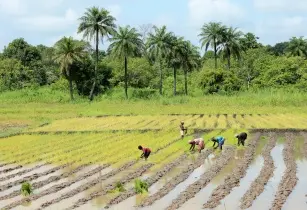At least 1,200 beneficiaries from the South East and Eastern regions of Mauritius have received starter kits under the Capacity Building and Start Up assistance through the Humanitarian Emergency Assistance Programme at the Maison des Pêcheurs in Mahebourg
The assistance programme is funded by the United Nations Development Programme (UNDP). Attorney-general and minister of Agro-Industry and Food Security Maneesh Gobin recalled that the oil spill caused by the wreckage of the bulk carrier vessel (MV Wakashio) in July 2020 at Pointe D’Esny brought much damage to the diverse marine system leading to a complete stop of all marine economic activities. In this context, urgent actions to mitigate the impact of the oil spillage were put in place, including the tripartite Funding and Implementation Agreement which was signed by the African Development Bank (AfDB), the Government of Mauritius, and the UNDP for humanitarian emergency assistance programme, he added.
The beneficiaries are from Quatre Soeurs, Grand River South East, Grand Sable, Mahebourg, and Vieux Grand Port. The symbolic handing over ceremony, organised by the Ministry of Agro-Industry and Food Security in collaboration with the Food and Agricultural Research and Extension Institute (FAREI), also comprised the handing over of training certificates to the beneficiaries and the launching of two booklets on household farming, composting and egg production.
Gobin highlighted that his ministry is providing several incentives to encourage self-sufficiency in some agricultural products. He added that this is the best option to reduce the consequential impacts of the pandemic COVID-19.
Minister of youth empowerment, sports and recreation Stephan Toussaint; minister of national infrastructure and community development Mahendranuth Sharma Hurreeram; member of parliament Rameswar Doolub; the United Nations resident cordinator Christine Umutoni and the officer-in-charge of the UNDP Tony Muhumuza, were present.
As regards the ongoing war between Ukraine and Russia, Toussaint highlighted that despite not being directly involved, Mauritius remains vulnerable to collateral damages, hence self-sufficiency is a necessity to generate an increase in local production.
“It is of utmost importance to find strategies to enable those most affected by the oil spill caused by the wreck of MV Wakashio, whose livelihood depended on the sea and other maritime activities,” Hurreeram said.
Umutoni underlined that this distribution of startup packs and training in food production supported by FAREI and UNDP are an important component of assistance to the victims of the Wakashio crisis. “They are one of the many tools and methods that the UN is using to support Mauritius strengthen its food system that will impact on the lives of many families and contribute towards the achievement of several Sustainable Development Goals (SDGs) as regards hunger, decent work and economic growth,” she said.
The UNDP has been at the forefront of integrated and inclusive response to challenges of this kind by developing grassroots sustainable alternative livelihood solutions. “In this context, the UNDP mobilised resources from the AfDB to the tune of US$500,000 and a grant of US$3.97mn was allocated to FAREI so as to facilitate capacity building and allocate starter kits to 225 households, representing some 1,200 beneficiaries, Muhumuza said.
He further reiterated the UNDP’s commitment to empower local communities in sustainable development initiatives such as the Responsible Party Agreement with Eco-Sud signed on 08 October 2021 for a grant amount of US$550,000 to support Coral Restoration activities during the next five years.
Under this agreement, the Eco-Sud will engage and train community members in the South-East region and at least 250 stakeholders, in the construction of nurseries, coral plantation techniques, establishment, monitoring and maintenance of coral nurseries, transplantation of corals, and monitoring and maintenance of restoration sites.





